The Armed Forces Medical College (AFMC) is a name to reckon with in the field of medical education. The celebrated temple of learning hones the skills and polishes the qualities of its students (better known as Cadets in the military set up). From the three branches of defence services - the armed forces, navy and air force, in order to transform them into worthy officers as well as capable doctors and nurses, who are committed to the health care needs of the personnel of the Indian army. Having produced more than 6500 doctors, the college has come a long way since its first batch passed out in 1966. Air Marshal C K Ranjan took over the reins of the esteemed institution in 2016 as its Commandant. In what could be termed as a glorious academic career, the Air Marshal, an alumnus of the Armed Forces Medical College, has held several significant appointments, Principal Medical Officer at Headquarters, Training Command, Indian Air Force; Professor and Head, Department of Aerospace Medicine at Institute of Aerospace Medicine in Bengaluru, to name a few. An excellent career profile coupled with his extraordinary leadership skills also earned him the appointment of Commandant of Air Force Central Medical Establishment (New Delhi); Commandant, Command Hospital Air Force, Bengaluru. The Commandant, who is wedded to a cardiothoracic surgeon, has a vast number of scientific journals and research publications to his credit. The recipient of Ati Vishisht Seva Medal and Vishisht Seva Medal has also won a Commendation Card by the AOC-in-C (Air Officer Commanding-in-Chief) in 1992 for his meritorious career. Air Marshal C K Ranjan, talks about AFMC and what makes it the excellent medical college that it is today, in a tell-all interview
Armed Forces Medical College, Pune has established itself as a centre of excellence in medical, dental, nursing and paramedical training and research, which is specific to the health care needs of the Armed Force
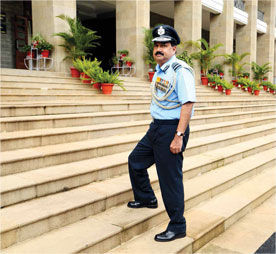
The Armed Forces Medical College was established on May 1 1948, as a central institution, by amalgamation of the Army Medical Training Centre (AMTC), the Medical Research Organisation, the Central Military Pathology Laboratory, the Army Transfusion Centre and the Central Army School of Radiology. It is the first medical institute established for the Armed Forces by any country in Asia. The Graduate Wing was added to the College on August 4, 1962 and the College of Nursing was established on November 10, 1964.
AFMC, Pune conducts undergraduate medical training for award of the MBBS degree, postgraduate training for award of MD degree in 17 disciplines, MS degree in six disciplines, MDS in four disciplines and DM/MCh/PhD in four disciplines. In addition, the College of Nursing conducts training for award of BSc (Nursing) degree and MSc (Nursing) in four disciplines. AFMC also conducts Bachelor of Paramedical Technologies (BPMT) courses in 11 disciplines, Postgraduate Diploma in Laboratory Technologies (DMLT) and several other courses for officers, nursing officers and paramedical staff of the three services (army, air force and navy).
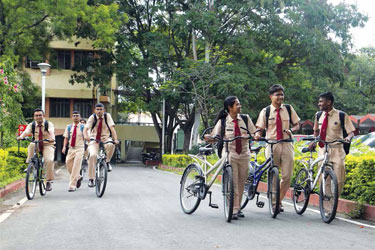 AFMC, Pune has an eco-friendly campus where students are permitted to use only bicycles
AFMC, Pune has an eco-friendly campus where students are permitted to use only bicyclesAFMC, Pune is affiliated to Maharashtra University of Health Sciences, Nashik. Training is imparted as per the guidelines laid down by the University and other statutory professional bodies. The students are simultaneously provided medical education as well as exposure to the specific health care needs of the Armed Forces. This is a unique feature of training at AFMC, Pune. Undergraduates are trained to become doctor-soldiers.
The pride of AFMC lies in the Graduate Wing, which conducts training for award of the coveted MBBS degree. It was established with the aim of providing well-trained and highly motivated Medical Officers for the Indian Armed Forces. The annual intake for this course is 135.
Admission to professional courses is on an all-India basis through a merit list that is drawn on academic performance in examinations such as National Eligibility and Entrance Test (NEET), All India Post Graduate Medical Entrance Examination (AIPGMEE)/ All India PG Dental Entrance Examination (AIPGDEE) and other entrance tests. In addition, nominated students from friendly foreign countries such as Nepal, Bhutan, Maldives, Sri Lanka, Myanmar, Seychelles and Afghanistan are also provided training of the highest standard.
Undergraduate students are commissioned into the Armed Forces Medical Services (AFMS), after completion of training. The AFMS has a tri-service affiliation. The students are allotted their service, that is, Army, Navy or Air Force on choice cum merit basis. They compete on merit for postgraduate seats through an all India PG entrance test. All nursing graduates are commissioned into the Military Nursing Service (MNS). They are selected for post-graduation on merit cum choice. Paramedical personnel are selected by their controlling authorities to undergo training in various disciplines, based on their merit and requirements of service.
There is no fixed ratio for deciding the number of cadets who will be commissioned into each of the three services. In 2017, 82 newly commissioned officers joined the Army, eight joined the Navy, whereas seven joined the Air Force. The Office of Director General, Armed Forces Medical Services (DGAFMS) takes a decision depending on the vacancies available in the three services.
All Medical Cadets are trained for award of MBBS degree as per the prescribed curriculum. In addition, they are also made aware of the health care needs of the three services. The decision to join the Army, Navy or Air Force is taken once the medical cadet graduates, on completion of training at AFMC. They receive military training that is specific to their service, after they complete their internship training. The Armed Forces Medical Services is a single organisation with affiliation to all three services and doctors can be moved from one service to another during their career. Therefore, there is no distinction in training that is provided to Medical Cadets in relation to their future choice of service.
The quality of life provided to cadets on campus allows them to evolve as human beings, even as they gain knowledge of medical science. The stress on all round development of personality is a hallmark of training imparted here. The overall milieu ensures that they imbibe officer like qualities by the time they graduate
Training is carried out as per a carefully planned programme that is tailor- made to meet the objectives of the MBBS course. Lectures, practicals, demonstrations and clinics are all well planned and conducted round the year, except for two short vacations. Students in the clinical terms receive training at the affiliated teaching hospitals. These include Command Hospital (Southern Command), Military Hospital (Cardiothoracic Centre), Military Hospital Kirkee, Artificial Limb Centre and Cantonment General Hospital, Pune. Apart from professional training, wide exposure is provided to Medical Cadets, which is aimed at their all-round development. Special emphasis is on personality development. There is a special multi-purpose facility ‘Aprameya’ to provide support for various extra-curricular activities. The Graduate Wing has a number of extra-curricular clubs and societies including, Musimatics, Dance & Dramatics Club, History and Heritage Club, Hobbies Club, Med Cine Club, Adventure Club, Computer Club, Gymnasium Club, Prayas Club, Students Scientific Society, Cycling Club, Debating Society, Literary Society and Racquet Club. Undergraduate medical students have the status of Medical Cadets.
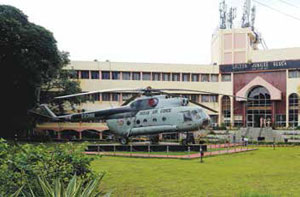 The campus has an impressive display of Tanks, Aircraft and to scale models of Ships, representing the affiliation of the Armed Forces Medical Services with all three services
The campus has an impressive display of Tanks, Aircraft and to scale models of Ships, representing the affiliation of the Armed Forces Medical Services with all three servicesThe Mission Statement of Armed Forces Medical College, Pune is ‘To provide comprehensive medical and nursing education to the cadets, students and student officers to ensure a holistic development of medical knowledge and skills with an aim to prepare technically competent medical professionals who are courteous, caring, compassionate human beings, conscious of social and environmental responsibilities’.
Till date, 6258 medical students have graduated from this institution. Over 1191 nursing graduates have passed out of the College of Nursing. The alumni of AFMC form the bulk of Officers serving in the Armed Forces Medical Services. Other graduates, who had opted out of service liability, or have been released after competing SSC or have proceeded on retirement, are working in various civilian medical institutions in India and in a number of countries all over the world. Wherever they are, AFMCites act as the brand ambassadors of the institution, which is renowned all over the world as a centre of excellence.
AFMC, Pune has an Alumni Association, which boasts of a strength of more than 6000 members. A number of alumni have distinguished themselves at the National and International level in medical science as well as other fields. They include Dr M K Bhan, Dr Soumya Swaminathan, Dr Gladwin Das, Dr Gurumukh Singh, Padamshree Dr Arvind Lal, Dr G Gopal Rao, Dr Sanjeev Arora, Dr Camila Rodriguez, Dr James Thomas, Padamshree Dr Rajagopal, Dr Arvind Chopra and Dr Zach Zachariah.
The faculty of AFMC are specially selected for their tenure in the college as teachers. They act as role models for cadets to emulate. The bedrock of institutional life is discipline. The quality of life provided to cadets on campus allows them to evolve as human beings, even as they gain knowledge of medical science. The stress on all round development of personality is a hallmark of training imparted here. The overall milieu ensures that they imbibe officer like qualities by the time they graduate.
Training at AFMC is provided free of cost to all undergraduate students. Facilities provided include free fully furnished hostel accommodation, free food, free books, free uniforms, canteen and extensive sports as well as recreational facilities. The students are provided free medical care and travel facilities (AC 3 Tier and Special Coaches). No tuition fees are levied on students.
AFMC empowers its graduates with knowledge and skills, endows them with mental robustness and physical fitness and inculcates a sense of dedication that enables them to perform their role as doctors in uniform to perfection. The quality of academic training is reflected in the professional calibre of the alumni. They are not only providing healthcare to the Army, Navy and Air Force in far-flung border areas, but also at the forefront of innovations at the tertiary care level.
AFMC empowers its graduates with knowledge and skills, endows them with mental robustness and physical fitness and inculcates a sense of dedication that enables them to perform their role as doctors in uniform to perfection. The quality of academic training is reflected in the professional calibre of the alumni
What sets apart a graduate of AFMC is that a cadet develops a positive attitude to life, is caring, dedicated, knowledgeable, physically fit, mentally tough and a leader. He is a soldier at par with other soldiers apart from being a doctor who is at par with the finest medical practitioners anywhere in the world. I would like to call it ‘the AFMC difference.’ The officer trained at the prestigious institute is a compassionate doctor, a brave soldier and an ethical achiever.
After commissioning, medical officers go for internship training to recognised service hospitals. Then, they undergo basic military training at Officers Training College in Lucknow. Upon the completion of their training, they are posted for a tenure of about three years in the border regions of the country. After completing four years of service, they qualify to undergo training for post-graduation. Thereafter, they are posted for tenures of three years’ duration in various units and hospitals as specialist officers. Some of them go for super-specialisation. After completing about twenty years of service, they are promoted to a level where they have to also work in administrative appointments. In the higher echelons, most of the appointments are of an administrative nature.
Medical Cadets are required to undergo a stringent physical examination when they join AFMC, Pune. They are required to participate in games and adventure activities. They are permitted to use only bicycles so that they keep fit. Additionally, there are regular periods for physical training and yoga. Other than that, they are provided very high quality meals in the Central Cadets Mess. Therefore, they are physically fit and mentally robust by the time they graduate from the college.
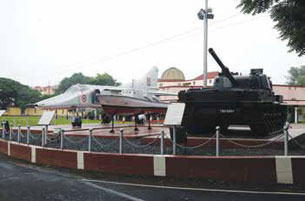
The system of health care in the Armed Forces Medical Services is structured in order to meet the heath care needs of the three services, in peace and war. Primary level care is provided by Medical Officers who are located with the soldiers, sailors and air warriors. They are provided with all the essential equipment and medicines for immediate medical care. There is a very well organised system in place for evacuating and transferring patients to peripheral and zonal hospitals that are located in all parts of the country. Where required, patients are further transferred to tertiary level hospitals, which are called command hospitals. All tertiary care centres are provided with stateof- the-art equipment and facilities. In the referral system, Army Hospital (Referral & Research), New Delhi is at the apex. The facilities are comparable with those available in the private sector heath care establishments.
The AFMC crest is ‘within a lotus wreath surmounted by the Ashoka lions is placed the rod of Aesculapius with serpent intertwined’. The snake is regarded as a symbol of wisdom, virility and eternity. It is depicted as being intertwined around the staff carried by Aesculapius, the Greek God of Healing. The same symbol is also found in Indian mythology. The two snakes symbolise ‘Kundalini’, the life of eternity. The lamp symbolises the eternal flame of knowledge and wisdom. All these elements have been brought together in the crest of AFMC, Pune.
The motto of the College is ‘Sarve Santu Niramayah’, which translates to ‘Let all be free from disease’.
The institution has been consistently ranked amongst the finest medical institutions in the country. It has received NAAC re-accreditation with CGPA of 3.66, which is amongst the highest awarded to any medical institution in the country
Outstanding sportspersons from the college include Maj. (Dr) S K Punia in Athletics, Dr Otilia Mascarenhas, who is a winner of the Arjuna Award in hockey), Brig. V P Dhand, who was conferred the Bharatshree Award and Lt. Gen. S A Cruze, known for his hockey and mountaineering skills.
Gallantry award winners include Capt. Devashish Kumar Sharma, recipient of Kirti Chakra (Posthumous). Several alumni, who have risen to the highest rank in the Armed Forces, have been conferred distinguished service awards by the President of India. Till date, three alumni of AFMC have held the appointment of DGAFMS. The DGAFMS and DGs of medical services of all three services today are alumni of AFMC.
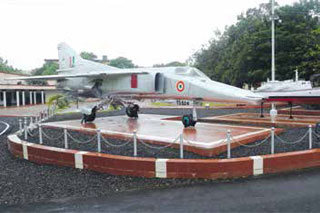
Faculty and postgraduate residents regularly attend professional conferences in their areas of specialisation. Many members of the faculty are members of professional bodies and on the editorial board of prestigious national and international journals. A large number of books and chapters have been authored by the faculty. Eminent personalities in the field of medical science are invited to speak on contemporary issues in health care as guest speakers. That aside, AFMC organises a large number of professional conferences, CME programmes (Continuing Medical Education programme) and workshops. These include the Armed Forces Medical Research Committee (AFMRC) meeting in February every year, where research project proposals submitted by officers of AFMS are discussed and sanctioned. AFMC has also been at the forefront of undergraduate medical research. A large number of Indian Council of Medical Research (ICMR) and Maharashtra University of Health Sciences (MUHS) funded projects are being carried out by cadets under the guidance of the faculty. AFMC hosts ‘Illuminati’, an undergraduate research conference at the national level every year to provide undergraduates a forum to showcase their research work and interact with eminent medical researchers.
AFMC, Pune has highly trained, qualified and experienced teachers. They are specially selected from the specialist cadre of AFMS. The calibre of teaching staff can be gauged from their academic qualifications and professional publications. AFMC, Pune and its affiliated teaching hospitals have more than 320 teachers as on date. In terms of qualifications, all teachers have post-graduate qualifications. As of today, 22 teachers have PhD/MCh/DM qualifications.
Medical Officers, Nursing Officers, postgraduates and paramedical staff of AFMS are selected for UN Peace Keeping Missions in all parts of the world. A large number of them have been trained at AFMC, Pune. Their competence has enhanced the reputation of the College as a centre of excellence in the field of medical education and training, specific to the health care needs of the Armed Forces.
Adequate opportunities are provided for professional growth and medical research. Doctors of the Armed Forces Medical Services are much sought after for their professional competence. Hence, re-settlement prospects after superannuation from service are excellent. Veterans of the AFMS are much sought after for their dedication, once they superannuate or take premature retirement. They are readily absorbed as specialists, health care administrators, nurses, and paramedical staff in the private health care sector. Faculty of AFMC, Pune are much sought after as teachers in private medical, nursing and dental colleges. There are several professional avenues available to veterans in the health care sector in India as well as abroad. Mentally robust by the time they graduate from the College.
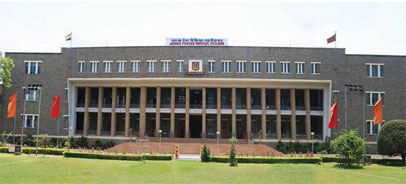 The Iconic Main building of AFMC, Pune was constructed between 1953 and 1956
The Iconic Main building of AFMC, Pune was constructed between 1953 and 1956I am a graduate of the Armed Forces Medical College, Pune myself. I was commissioned into the Indian Air Force in year 1980. I have done my MD and DNB (Diplomate of National Board-a title conferred by the National Board of Examinations, an autonomous academic body under the Ministry of Health and Family Welfare, on candidates who successfully complete their postgraduate or postdoctoral medical education under it) in Aviation Medicine. I am a graduate from Defence Services Staff College, Wellington. I have also been awarded an M Sc degree in Defence Studies and M Phil in Hospital and Health System Management. During my career, I have held various specialist and staff appointments including Professor and Head, Department of Aerospace Medicine at Institute of Aerospace Medicine, Bengaluru, Commandant, Air Force Central Medical Establishment, New Delhi, Commandant, Command Hospital Air Force, Bengaluru, and Additional DGAFMS ( E&S) in the Office of DGAFMS (Director General Armed Forces Medical Services). I was holding the appointment of Principal Medical Officer, Headquarters, Training Command, Indian Air Force prior to assuming command of my alma mater.
What sets apart a graduate of AFMC is that a cadet develops a positive attitude to life, is caring, dedicated, knowledgeable, physically fit, mentally tough and a leader. He is a soldier at par with other soldiers apart from being a doctor
Armed Forces Medical College, Pune has established itself as a centre of excellence in medical, dental, nursing and paramedical training and research, which is specific to the health care needs of the Armed Forces. The Institution has been consistently ranked amongst the finest medical institutions in the country. It has received NAAC re-accreditation with CGPA of 3.66, which is amongst the highest awarded to any medical institution in the country. At AFMC, the finest clinicians, surgeons and stalwarts in medical science utilise their vast collective experience as teachers and researchers to pass on the baton of knowledge to the next generation of health care professionals, with unsurpassed devotion and care. The Institution will continue to grow in stature in the years to come and we hope that it will be accorded the status of an Institute of National Importance. Given the core values that guide members of the Armed Forces Medical Services, apart from professional competence, doctors in uniform will enhance further on the fine reputation they have built for themselves for all round excellence, as doctors and soldiers, in the years to come.
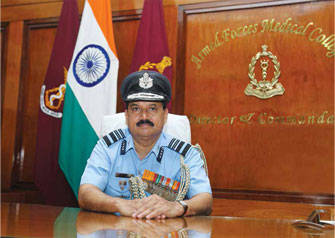
By Namrata Gulati Sapra